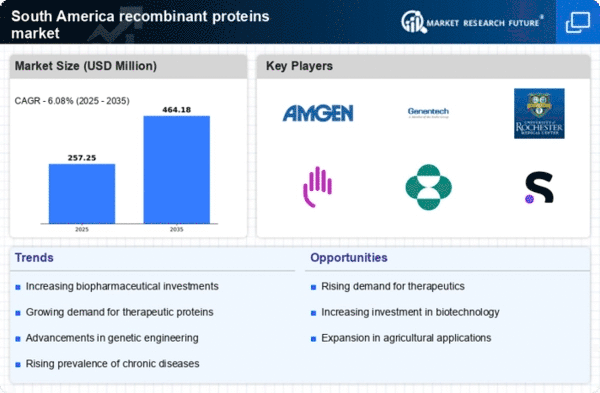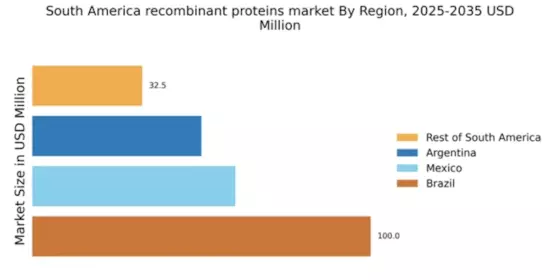Expansion of Research Institutions
The proliferation of research institutions dedicated to biotechnology and life sciences in South America is a key driver for the recombinant proteins market. These institutions are fostering innovation through collaborative research and development initiatives, which are essential for advancing recombinant protein technologies. In 2025, the number of biotechnology research centers in South America is expected to increase by 20%, reflecting a growing commitment to scientific exploration. This expansion not only enhances the region's capacity for producing recombinant proteins but also attracts international partnerships and funding. As these institutions focus on developing novel applications for recombinant proteins, the market is likely to benefit from a steady influx of new products and technologies. This collaborative environment is crucial for sustaining growth and ensuring that the recombinant proteins market remains competitive on a broader scale.
Advancements in Genetic Engineering
Technological advancements in genetic engineering are significantly impacting the recombinant proteins market in South America. The emergence of CRISPR and other gene-editing technologies has revolutionized the production of recombinant proteins, allowing for more precise modifications and higher yields. This innovation is particularly relevant in the agricultural sector, where genetically modified organisms (GMOs) are being developed to enhance crop resilience and productivity. In 2025, the market for genetically engineered crops in South America is expected to grow by 15%, indicating a strong correlation with the recombinant proteins market. These advancements not only improve the efficiency of protein production but also reduce costs, making therapeutic proteins more accessible. As research institutions and companies continue to invest in these technologies, the recombinant proteins market is poised for substantial growth.
Rising Biopharmaceutical Development
The biopharmaceutical sector in South America is experiencing a notable surge, driven by the increasing demand for innovative therapies. This growth is reflected in the recombinant proteins market, where the development of biologics is becoming a focal point. In 2025, the biopharmaceutical market in South America is projected to reach approximately $20 billion, with recombinant proteins playing a crucial role in this expansion. The region's investment in research and development is fostering a conducive environment for the production of therapeutic proteins, which are essential for treating various diseases. As regulatory frameworks evolve, the recombinant proteins market is likely to benefit from streamlined approval processes, further enhancing the availability of these critical products. This trend indicates a robust future for biopharmaceuticals, with recombinant proteins at the forefront of therapeutic advancements.
Increasing Focus on Personalized Medicine
The shift towards personalized medicine is reshaping the landscape of the recombinant proteins market in South America. As healthcare systems increasingly adopt tailored treatment approaches, the demand for specific recombinant proteins that cater to individual patient needs is on the rise. This trend is supported by the growing understanding of genetic variations and their implications for drug efficacy. In 2025, the personalized medicine market in South America is projected to reach $5 billion, with recombinant proteins being integral to this growth. The ability to produce customized therapeutic proteins enhances treatment outcomes and patient satisfaction. Furthermore, as healthcare providers emphasize precision in treatment, the recombinant proteins market is likely to see an uptick in investments aimed at developing targeted therapies, thereby expanding its reach and impact.
Government Support and Funding Initiatives
Government support and funding initiatives are playing a pivotal role in the growth of the recombinant proteins market in South America. Various national governments are recognizing the potential of biotechnology to drive economic development and improve public health. In 2025, it is anticipated that government funding for biotechnology research will increase by 25%, providing essential resources for the development of recombinant proteins. This financial backing is crucial for startups and established companies alike, enabling them to invest in research, production facilities, and workforce training. Additionally, favorable regulatory policies are being implemented to streamline the approval process for recombinant protein products. As a result, the recombinant proteins market is likely to experience accelerated growth, driven by enhanced innovation and increased production capabilities.


















Leave a Comment